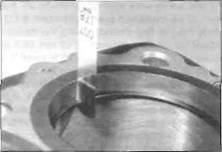
|
Читайте также: |
• Locking compounds are used in locations where the fastener is prone to loosening due to vibration or on important safety-related items which might cause loss of control of the motorcycle if they fail. It Is also used where important fasteners cannot be secured by other means such as lockwashers or split pins.
• Before applying locking compound, make sure that the threads (internal and external) are clean and dry with all old compound removed. Select a compound to suit the component being secured - a non-permanent general locking and sealing type is suitable for most applications, but a high strength type is needed for permanent fixing of studs in castings. Apply a drop or two of the compound to the first few threads of the fastener, then thread it into place and tighten to the specified torque. Do not apply excessive thread locking compound otherwise the thread may be damaged on subsequent removal.
• Certain fasteners are impregnated with a dry film type coating of locking compound on their threads. Always renew this type of fastener if disturbed.
• Anti-seize compounds, such as copper-based greases, can be applied to protect threads from seizure due to extreme heat and corrosion. A common instance is spark plug threads and exhaust system fasteners.
3 Measuring tools and gauges
Feeler gauges

|
| 3.1 Feeler gauges are used for measuring small gaps and clearances - thickness is marked on one face of gauge |
• Feeler gauges (or blades) are used for measuring small gaps and clearances (see illustration 3.1). They can also be used to measure endfloat (sideplay) of a component on a shaft where access is not possible with a dial gauge.
• Feeler gauge sets should be treated with care and not bent or damaged. They are etched with their size on one face. Keep them clean and very lightly oiled to prevent corrosion build-up.
• When measuring a clearance, select a
gauge which is a light sliding fit between the
two components. You may need to use two
gauges together to measure the clearance
accurately.
Micrometers
• A micrometer is a precision tool capable of measuring to 0.01 or 0.001 of a millimetre. It should always be stored in its case and not in the general toolbox. It must be kept clean and never dropped, otherwise its frame or measuring anvils could be distorted resulting in inaccurate readings.
• External micrometers are used for measuring outside diameters of components and have many more applications than internal micrometers. Micrometers are available in different size ranges, eg 0 to 25 mm, 25 to 50 mm, and upwards in 25 mm steps; some large micrometers have interchangeable anvils to allow a range of measurements to be taken. Generally the largest precision measurement you are likely to take on a motorcycle is the piston diameter.
• Internal micrometers (or bore micrometers) are used for measuring inside diameters, such as valve guides and cylinder bores. Telescoping gauges and small hole gauges are used in conjunction with an external micrometer, whereas the more expensive internal micrometers have their own measuring device.
Дата добавления: 2015-10-29; просмотров: 169 | Нарушение авторских прав
| <== предыдущая страница | | | следующая страница ==> |
| Thread repair | | | Internal micrometer |